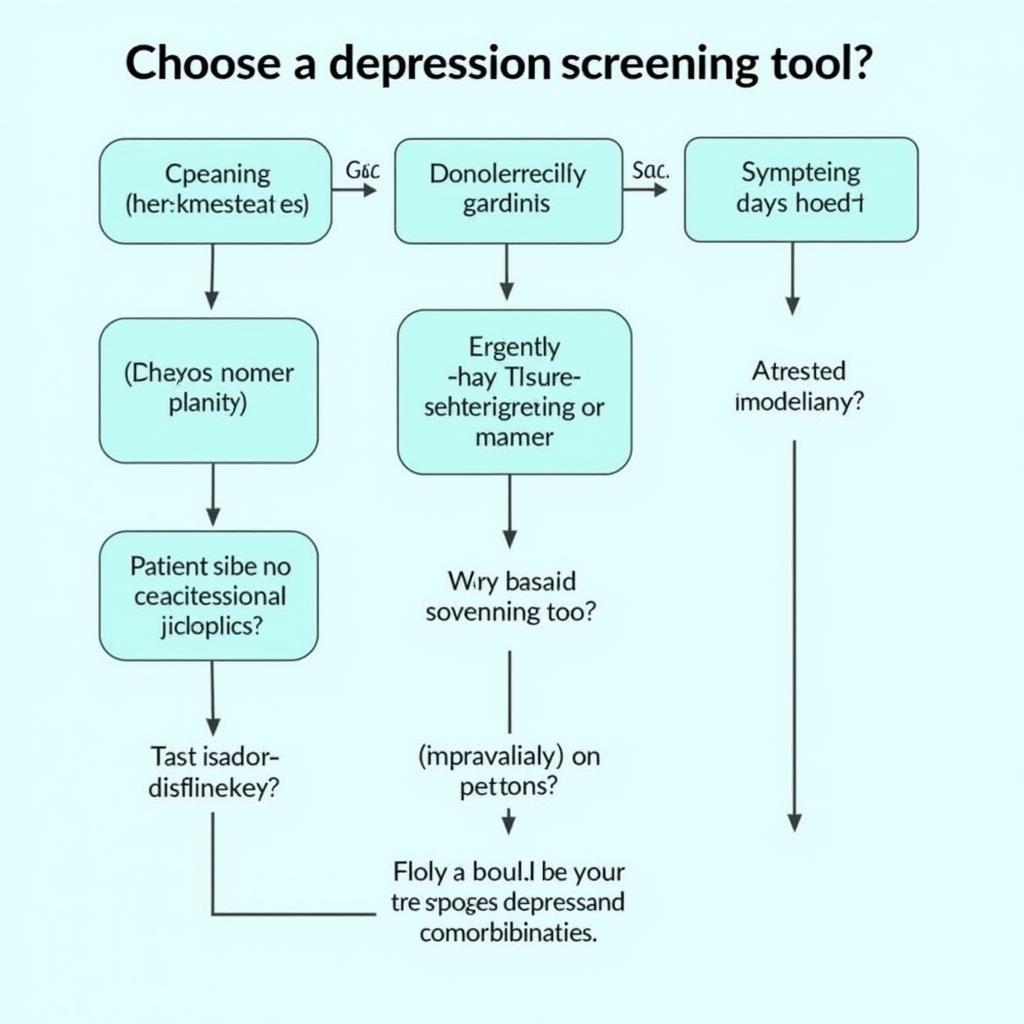Depression screening tools are crucial for identifying affective disorders in primary care settings. These tools provide a standardized approach to assess symptoms, helping clinicians identify individuals who may benefit from further evaluation and treatment. Early detection through these screening tools can significantly impact patient outcomes and overall well-being.
Understanding the Need for Depression Screening Tools in Primary Care
Primary care physicians are often the first point of contact for individuals experiencing mental health concerns, including depression. However, recognizing the subtle signs of depression can be challenging in a busy primary care setting. Depression screening tools provide a quick and efficient method for identifying potential cases of affective disorder.  Depression Screening Tools in a Primary Care Setting
Depression Screening Tools in a Primary Care Setting
Common Depression Screening Tools for Primary Care
Several validated depression screening tools are readily available for use in primary care. Some of the most commonly used include:
- PHQ-9 (Patient Health Questionnaire-9): A widely used nine-item questionnaire that assesses the severity of depression symptoms.
- PHQ-2 (Patient Health Questionnaire-2): A shorter two-item version of the PHQ-9 used as an initial screening tool.
- GAD-7 (Generalized Anxiety Disorder-7): Although primarily used for anxiety, the GAD-7 can also indicate the presence of depression, as anxiety and depression often co-occur.
- Beck Depression Inventory (BDI): A more comprehensive self-report inventory often used in research settings and by mental health professionals.
Choosing the Right Depression Screening Tool
The choice of depression screening tool depends on several factors, including the patient population, the time available for screening, and the clinician’s familiarity with the tool. The PHQ-2 and PHQ-9 are particularly well-suited for primary care settings due to their brevity and ease of administration.  Selecting Appropriate Depression Screening Tools for Primary Care
Selecting Appropriate Depression Screening Tools for Primary Care
Interpreting Depression Screening Tool Results
It’s essential to understand that depression screening tools are not diagnostic tools. A positive screening result indicates the need for further evaluation, not a definitive diagnosis of depression. A comprehensive clinical interview is necessary to confirm the diagnosis and determine the appropriate treatment plan.
Benefits of Using Depression Screening Tools: Primary Care Screener for Affective Disorder
Integrating depression screening tools into routine primary care practice offers several benefits, including:
- Early Detection: Identifying depression early on can lead to more timely interventions and improved outcomes.
- Improved Patient Care: Screening helps ensure that patients with depression receive the necessary care and support.
- Reduced Stigma: Normalizing mental health screening in primary care can help reduce the stigma associated with seeking help for depression.
- Enhanced Patient-Physician Communication: Screening provides an opportunity for open dialogue about mental health concerns.
“Implementing routine depression screening in my primary care practice has significantly improved my ability to identify and address the mental health needs of my patients.” – Dr. Emily Carter, Family Physician.
Addressing Patient Concerns and Ensuring Follow-Up
Patients may have questions or concerns about depression screening. It’s crucial to address these concerns and provide clear information about the purpose of screening and the next steps if a positive result is obtained. Ensuring appropriate follow-up and referral to mental health services is critical for effective management.
How Depression Screening Tools Improve Patient Outcomes
Early detection of affective disorders, facilitated by depression screening tools primary care screener, can significantly improve patient outcomes. Prompt intervention can reduce the severity and duration of depressive episodes, preventing long-term disability and improving overall quality of life.
“Early identification of depression through screening has transformed my practice. I’m now able to connect my patients with the resources they need to manage their mental health effectively.” – Dr. David Miller, Internist.
Conclusion: Depression Screening Tools in Primary Care
Depression screening tools are invaluable resources for primary care providers. These tools facilitate early detection of affective disorders, leading to timely intervention and improved patient outcomes. By incorporating these tools into routine practice, primary care physicians can play a crucial role in addressing the mental health needs of their patients. Integrating depression screening tools is a vital step in improving patient well-being.
FAQ
- How often should depression screening be conducted in primary care?
- Are there specific depression screening tools for adolescents and older adults?
- What are the next steps after a positive depression screening result?
- How can primary care physicians effectively communicate with patients about depression?
- What resources are available for patients diagnosed with depression?
- How can healthcare systems support the implementation of depression screening in primary care?
- What are the limitations of depression screening tools?
Common Scenarios and Questions
- Scenario: A patient reports feeling tired and having difficulty sleeping. Question: Should this patient be screened for depression?
- Scenario: A patient scores positively on a depression screening tool but denies feeling depressed. Question: How should this situation be handled?
- Scenario: A patient is reluctant to complete a depression screening questionnaire. Question: How can the physician encourage participation?
Related Resources and Articles
- Visit our website for more information on mental health resources.
- Read our article on “Understanding and Managing Depression.”
If you need assistance, contact us via WhatsApp: +1(641)206-8880, Email: [email protected] or visit us at 910 Cedar Lane, Chicago, IL 60605, USA. We have a 24/7 customer support team available.

Leave a Reply